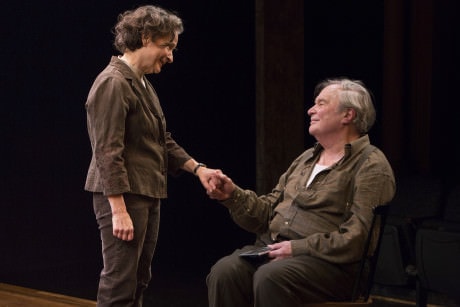Regular Singing, the 4th play in Richard Nelson’s Apple Family Cycle and now playing in repertory with Sorry (the 3rd play) at Studio Theatre, is a 2-hour dirge, a threnody if you will, with much speaking and a little singing, a lament for the dying of liberalism, of the invisible Andy, and of us all.

If action, dramatic or heroic, is your idea of the “theatrical,” then Regular Singing is not for you. The play has the same naturalistic, slice-of-life style save the epilogue as the other three plays in the cycle, the same homogeneous, liberal family of three sisters and a brother and an uncle, same rituals of eating and drinking and talking, same fine cast of actors; but by play #four and the oft-repeated theme of death and its knock, the characters are no longer resistant to the call; they are merely looking for ways to cope.
So you’ll find no “Rage, rage against the dying of the light.” (Dylan Thomas, Do Not Go Gentle into that Good Night)
And no “I’d be bored. You’d be bored. Birth, copulation and death.” (T.S. Elliot, Fragment of an Agon)
And definitely no “Death is no more than passing from one room into another. But there’s a difference for me, you know. Because in that other room I shall be able to see.” (Helen Keller)
No, in Regular Singing, playwright Nelson gives us November 2013, the 50th anniversary of John F. Kennedy’s assassination. Apparently, in the heart of New York liberalism, that 50th commemoration held a special sway over hearts and minds.
Barbara, the eldest of this family of Apples (played by the always rambunctious Sarah Marshall), has given her high school classes assignments designed to highlight the meaning of JFK’s death for a new generation, with special attention given to making it meaningful to their present lives.
The long suffering Marian (played by the always authentic Elizabeth Pierotti), who in Sorry had hopes of a new lover, has now re-united with her ex-husband, Andy, but only as he lies in an upstairs’ bedroom, gasping in death’s cancerous grip. We never see Andy, but only hear his occasional groans vis-à-vie a baby monitor.
Jane (played by Kimberly Schraf and given a wonderfully intelligent charm) seems happy. Now, the unpublished writer and mom, who still doesn’t have a job and no visible means of support, has convinced her younger, longtime boyfriend actor, Tim (played with incredible good cheer by Jeremy Webb), to give up his acting career and move to the New York village of Rhinebeck and become a waiter at a local restaurant.
Meanwhile, Benjamin, the famous actor uncle (played by the superlative Ted Van Griethuysen), has returned home for the weekend, from his “inn” at the assisted living Beacon; and he’s looking better than ever and apparently no longer suffers from disinhibition, i.e., making inappropriate sexual advances on voluptuous strangers and frightened loved ones.
Finally, there is Richard (played by the always engaging Rick Foucheux) who, as a corporate lawyer that flirted with republicans and seemed hostile to Obama and Andrew Cuomo, has long been the “black” sheep of this deep-rooted “liberal”–not progressive, damnit!–family.
Now, that his wife has left him for her lover and he’s joined Andrew Cuomo, democrat governor of New York, Richard spends most of Regular Singing bombarded by barbs from Barbara and badgered by Marian and left unsupported by Jane, all of whom later purport to be worried about him and want him to return to Rhinebeck and live in the family basement.
I guess you have to live in New York, and be familiar with Rhinebeck, to understand what in the hell is so attractive about the place that it would make people want to live there, even if it means giving up one’s dreams (Tim) and suffering daily the relentless harassment of your sisters (Richard).
If you are like me, you understand by now that Regular Singing, really isn’t about singing except in the abstract–it must be the white “liberal” approach to harmony, or what my architect brother used to call “talk-itecture” for those who don’t really like to draw, or what the logocentric elites consider “doing” for the disinclined.
Regular Singing is really about regular dying and the religious funerals that used to comfort us, but that are now present only as an absence, having already died for many people beneath the large feet of liberalism’s secular toes.
Director Serge Seiden has handled the play’s slice-of-life style with the same deftness as with the cycle’s earlier plays. Without utilizing the dramatic tension of smaller family conflicts, that were present in the other three plays, however, Regular Singing relies more on its sometimes interesting discourse on particular subjects to maintain audience interest.
Sometimes it might be how public school teaching is different; sometimes, how the neighborhood is different; sometimes, how the nature of consciousness itself might be altered.
Either way or what, you might find yourself moving in and out of consciousness yourself.
Set Designer Debra Booth, Lighting Design Daniel MacLean Wagner, Costume designer Helen Huang, and sound designer Palmer Hefferan create an effective naturalism on the small thrust stage.
If you’ve seen That Hopey Changey Thing and Sweet and Sad, which played at Studio two years ago in 2013, and you identified with the characters and their emotional journeys, then Regular Singing might work for you. Being around its familiar characters, you might find comfort in its lament about the omnipresence of death–both real and in the abstract.
The death of Andy, whom you have never met, might bother you.
You might find Marian’s distress over him inexplicably empathetic, unless you’ve also lost a child and know what it’s like to lose the father of that child; then you will need no explanation.
Barbara’s lament over Kennedy’s assassination might resonate, particularly if you have a fondness for Camelot; otherwise, the upcoming 50th anniversary of Martin Luther King’s assassination might resound more fully.

Tim’s dead dream might clearly ring a bell or two, and you will admire how chipper he is for village life and serving breakfast to strangers.
Benjamin–well, you mourned for him during Sorry and drew a frightened breath for your own aging self, saying, “Please, oh please spare me from making inappropriate sexual gestures unknowingly in elder life.”
And Jane, ironically, seems more blessed than other Apples: though jobless and unsuccessful in her chosen career, she is happiest most of all.
If, on the other hand, you’ve not seen the first three plays in the cycle, as I have, this wonderful set of characters will utterly fascinate you. You won’t understand much of their back story, of course; but like in any TV show that you join in the final season, with interest piqued, you might venture back to the first three shows when their lives had a lot more moving parts.
Running Time: Approximately two hours, with no intermission.

LINK:
The Apple Family Cycle: ‘Sorry’ at The Studio Theatre reviewed by John Stoltenberg on DCMetroTheaterArts.




